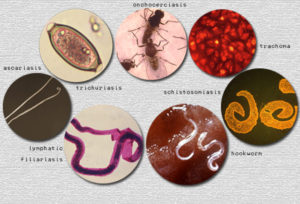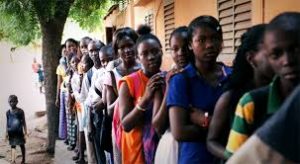What are Neglected Tropical Diseases? 
These are diseases of poverty as they mainly affect populations living in poverty, without adequate sanitation and in close contact with infectious vectors, domestic animals and livestock. They are the most common afflictions affecting many populations, with children being the most vulnerable group and 90% of the disease burden occurs in Africa.
From infection, the parasites multiply and migrate through the body, maturing and accumulating in various tissues, internal organ, the eyes or lymphatic system. If left undetected and untreated, the damage is irreversible causing physical, social and health burden such as blindness, deformation and destroy the skin. Those infected suffer a lot of human misery due to stigma as well as economic burden due to reduced economic productivity of the adult population.
Why are they neglected?
Despite the severe pain and life-long disabilities they cause, these diseases are often neglected. This is because;
- They are not highly visible as they do not kill a large number of people as compared to the BIG3(HIV/AIDS, tuberculosis and malaria) which have a higher mortality rate, attracting more attention nationally and internationally.
- They do not travel internationally so do not affect wealthy nations.
- The stigma associated with NTDs makes those affected reluctant to seek care.
- They affect the poorest of the poor thus limiting the incentive for the development of new diagnostic tools, drugs and vaccines for diseases with markets that cannot pay.
The World Health Organisation(WHO) recognises that there are numerous neglected tropical diseases in the world, however, only 17 of these NTDs are given priority. These poverty-related diseases that tend to affect many populations worldwide are grouped into two groups; those treated by use of preventive chemotherapy (PC) and those treated by innovative and intensified disease management. PC involved mass drug administration and aims to treat populations at risk of human helminths diseases so as to prevent transmission or morbidity of these diseases by administering drugs alone or in combination. Subsequently, intensified disease management involves individual case finding and case management.
In Africa, 10 of these NTDs are predominant, with the PCs being lymphatic filariasis (elephantiasis), onchocerciasis (river blindness), schistosomiasis, soil-transmitted helminthiasis, and trachoma while those requiring intensified care management include buruli ulcer, endemic treponematoses (yaws), foodborne trematodiases, human African trypanosomiasis (sleeping sickness), leishmaniasis and leprosy (Hansen disease).
In Cameroon the most prevalent ones are;